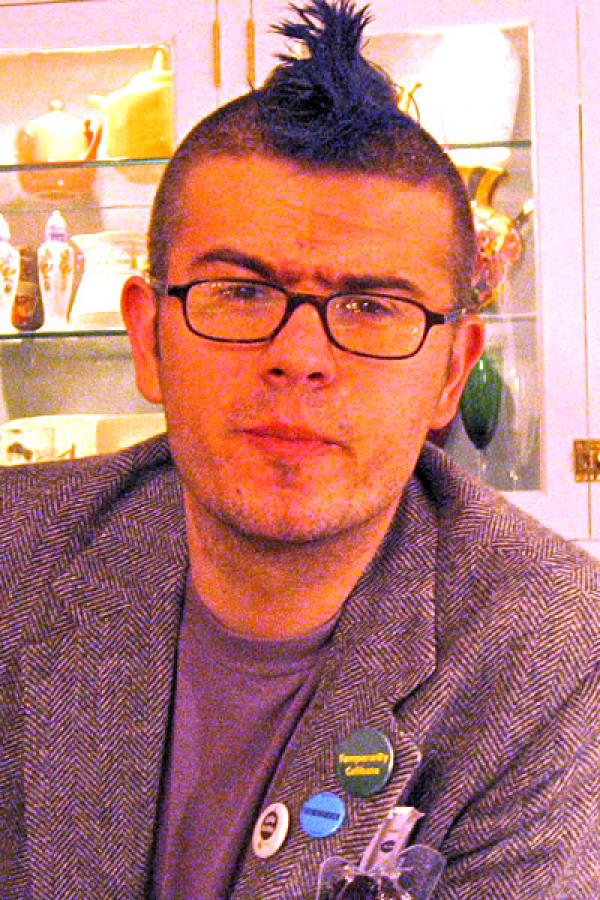Ismet Prcic

Photo by Melissa Hansen Prcic
Bio
Ismet Prcic is a thirty-two-year-old Bosnian-American writer currently residing in Portland, Oregon, with his wife and two cats named after Russian prostitutes. He holds an MFA in Writing from the University of California in Irvine where he received one half of the Glenn Schaeffer Award in Fiction. His first novel (…shards…) will be published by Grove Press in the winter of 2011. His work has appeared in McSweeney's Quarterly Concern, Bat City Review, Faultline, Prague Literary Review, and in various online journals. More information is available at www.ismetprcic.com, which will be better organized, I swear it.
Author's Statement
At the age of twelve I wrote a play entitled, Captain Huso and the Quest for the Magic Potion that was branded too racy to be included on a bill of student-written one-acts at my elementary school, which was then in communist Yugoslavia, and is now in the sliced up and bandaged ex-part of it called Bosnia and Herzegovina. The school board had a problem with its content because the play followed a soldier on a quest to find an elixir that would make his wife able to have children, only to find out that he was the one with the problem all along. My dad was summoned by the principal who, detecting subversive themes in my work, wanted to know if I was trying to desecrate the legacy of the Yugoslav National Army by publicly portraying it as impotent. The incident eventually blew over. As for the Yugoslav National Army it, unfortunately, proved to be quite potent at the raping and mass-murdering of civilians and the scattering about of a million refugees all over the world, Yours Truly to name one of them.
Thank you so much for taking me in. Thank you so much for hearing me. Thank you so much for the award that makes all the difference.
From the short story Porcus Omnivorus
Mustafa's grandfather was born in a shed. The shed was right next to a puny, derelict house where the rest of his family sat in miserable silence. They were awaiting this newest addition to the already swarming Nalic household with dread. The room was pungent with smoke from a malfunctioning chimney and all of their bellies crackled with need. The first milk from his mother's breast was sparse. When she brought him into the house the family looked at him and saw not a son or a brother but an enemy.
One of their two rooms was larger than the other; it served as a kitchen, a living room, a dining room, a children's room, and, at night, a bedroom. His parents slept in the remaining room unless they had guests over, in which case they would give up their privacy and pile in with the children. There was a single outhouse in the backyard, a little ways from the shed. Two other brothers camped in the shed unless it was wintertime, in which case they too would pile in with the children. One of the older brothers had recently married and found a small, derelict house of his own.
Their father was a pious mason and a spare-time farmer who demanded quiet at all times. He ran his family according to the unwritten code of seniority he'd grown up on, the code of not speaking unless addressed, of politeness to the point of belly-crawling, of always telling the truth even if it meant your death, of never smiling, because others might be miserable, of never crying, because others might be cheerful, of keeping your honor in the community by any means necessary, of saving your best food for guests even when you had to put a piece of glass over a handful of shredded cheese so that the smallest of your children would think they were eating it as they dabbed away at the glass with dry bread. The minutest transgressions would be answered with beatings.
Their mother hardly spoke, would walk ten steps behind her husband and turn away to cry despite her veil.
Unlike his siblings, Mustafa's grandfather was good at school. But the spines of countless books were broken against the walls of their room by his father, who couldn't stand anybody being engrossed in another world while he suffered in brutal reality. Often he tore the yellowy manuscripts from his son's hands and fed them into the mouth of the furnace, in this way intending to educate him in what was real.
Things were like this until the imam of the local mosque, the most respected elder they had, congratulated him on having such a clever son and said that it would be a shame if the boy didn't go further in his studies. The ink of a scholar is more valuable than the blood of a martyr, he told the congregation. This would have had no bearing on Mustafa's great-grandfather's decision to mold his son into a bricklayer like himself had it not been uttered in the company of influential villagers after a Friday prayer. As it was, it became a social obligation. So with great reluctance and minimal allowance, Mustafa's grandfather, at the age of eighteen, was sent to a medresa in Tuzla to become an imam.

